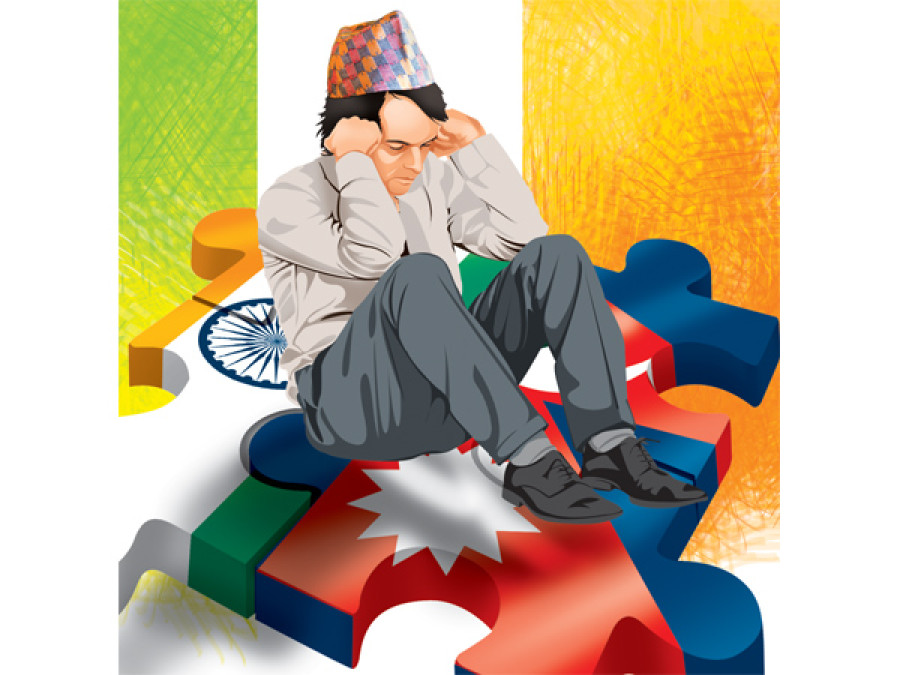Opinion
Out of frying pan
Nepal should learn from the ongoing blockade and end its dependency on India
Gyan Basnet
The lives of millions of people in Nepal, already crippled by the April earthquake and its subsequent aftershocks, have been further devastated by the undeclared economic blockade by India that has continued for over a month. People do not know what to expect next. They are unable to travel because there is no gasoline. They cannot cook food because there is no gas. Eventually food, water, medicine and other daily essentials will also run out if the blockade continues. Nepali people marked a sombre Dashain festival recently, and another festival is just around the corner.
Attack on sovereignty
According to international law, a blockade is one of a methods of warfare, thereby the undeclared blockade amounts to an undeclared war against the people of Nepal. It is also an attack on Nepali sovereignty. However, it indicates many more things. First, it is illegal: it violates all international laws and the internationally established code of conduct, traditions, and customs among states. It is also against the Nepal-India Peace and Friendship Treaty, international trade rules of the World Trade Organisation and, most importantly, it is against the established norms and values of Saarc itself.
Second, India’s ill-conceived action against Nepal is a crime against humanity and an insult to the dignity of the people. The domineering move by India violates people’s economic, social and cultural, civil and political rights. Most importantly, it violates the rights of the people of Nepal to lead a dignified life. It is a disgrace that the so-called largest democracy in the world can so easily escape its extraterritorial human rights obligations and responsibilities as required by the norms and values of international human rights documents. Moreover, the inhumane blockade by India is more than just illegal; it is against human conscience.
Find a solution
Against this backdrop, Nepal needs to carefully figure out its next move. The primary duty of a state or government is to protect, promote and fulfil the needs of its population. Because of the unexpected blockade, people have been suffering for over a month, and the government seems to be helpless. There is no excuse for the government; it must act fast to fulfil the needs of the people and end the crisis.
It must find a viable alternative. The people deserve answers and explanations. Otherwise, they have every right to revolt against the present government.
First, the biggest problem is that Nepal is totally dependent upon imports from India, including much of our food, consumer goods and 100 percent of our fuel—aviation fuel, petrol, diesel and cooking gas. This is the major cause and consequence of past and present fuel crises. We must learn lessons and prepare for the future. The Indian trade monopoly in Nepal must be ended. We must approach other countries to fulfil our fuel requirements. Proper homework and a pragmatic mechanism are required for this. The recent agreement signed by the Nepal Oil Corporation and PetroChina could be the new beginning that is sorely needed. We must establish this fresh agreement and build on it in a permanent and pragmatic way. This accord and any subsequent pacts between the two countries must be based on mutual cooperation. They must be transparent, inclusive and, most importantly, based on equality. It must be a win-win situation for both sides. Finding a permanent solution to the enduring fuel problem has become more vital than ever before.
Second, the present blockade is one imposed by our southern neighbour. Therefore, we must learn from this experience and be prepared. For that, we must invest in producing energy by ourselves. As we have the water resources, the focus should be on producing electricity through hydropower. Furthermore, various studies have demonstrated that there are chances of finding petroleum in the country. A proper and effective exploration based on pragmatic mechanisms and strategies must be conducted on it. Promulgating dynamic laws, programmes and policies to resolve the energy crisis will be an important step forward in becoming self-reliant in energy within the next few decades.
Redefine relations
Finally, why is our government unable to declare that India’s move is a deliberate blockade? The Nepali people need to know. We cannot delay internationalising the illegal and undeclared trade blockade any longer. As an independent and sovereign nation and one of the oldest members of the United Nations, one cannot help but wonder what is stopping Nepal from doing so. Nepal claims rights as a landlocked nation in accordance with various international laws, treaties and traditions as well. So we must properly use our diplomatic channels—and the UN too—to do that. At the same time, we must continue a high-level political dialogue with India to end the crisis. Only bilateral political talks, cooperation and acts to convince each other can help find a viable and permanent solution.
Towards that end, there is a need to redefine our relationship with India based on equality. Many old unequal treaties between the two countries might have to be revaluated for this. Openness, respect and mutual cooperation will decide the course of future relations between the two neighbours. In the meantime, just removing the blockade by India will not be enough. Nepali people also deserve a sincere apology from India.
Basnet holds a PhD in human rights from Lancaster University




 10.12°C Kathmandu
10.12°C Kathmandu










